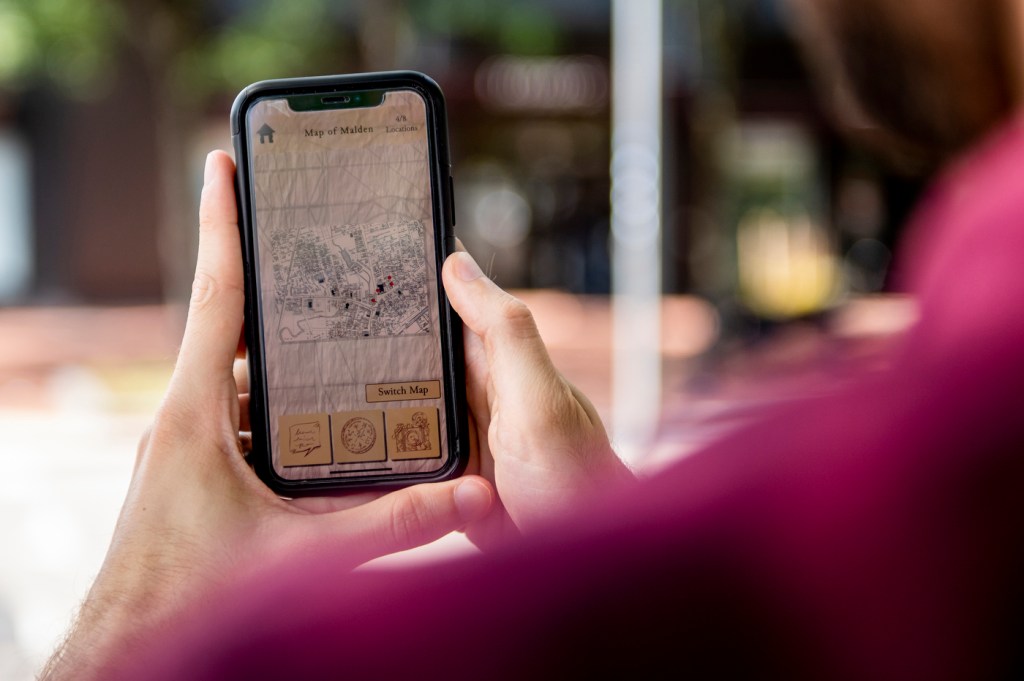The future of historical tourism is on your phone

In Malden, Massachusetts, history always sits just beneath the surface–sometimes all it takes is a cell phone to uncover it.
That’s the premise of “Chronosquad,” a new augmented reality game that takes players on a guided historical tour through the streets of Malden, a small city north of Boston. It’s an unconventional way to expose the city’s 373 years of history, but one that cities and tourism companies are now using to attract tourists in the age of COVID-19.
Designed by Celia Pearce, a professor of game design at Northeastern University, and a team of former students, the game is similar to Pokemon Go, the global AR phenomenon from 2016. Using the camera on their cellphones, players scan real world objects to initiate a stop on the tour. At each stop, characters in the game will appear on the screen, layered over the real world, to teach players about specific elements of Malden history, ranging from abolition and suffrage to immigration and the famous bank robbery/murder involving an heir to the Converse fortune.
In the world of “Chronosquad,” the player must help the eponymous group of time traveling history buffs discover Malden’s history. The time traveling premise illustrates Pearce’s goal with the project.
“It’s a way of looking back in time but also connecting the present to history,” Pearce said. “We also thought an activist theme was one that would resonate with different generations and also connect it back to what’s going on with activism now and celebrate progressive ideas in the past that now we take for granted.”
“Chronosquad” is part of a broader initiative by the city of Malden to establish a gaming district in the city’s downtown business hub, further evidence that localities are starting to understand the economic value of video game culture. According to Kevin Duffy, strategy and business development officer for the city of Malden, the effort started in 2015 after Boda Borg, a “live video game” space that offers “quests” with obstacle courses and puzzles, opened on Pleasant Street.

As soon as it opened, Boda Borg started bringing in business, mostly from outside the city. Duffy, a self-proclaimed gamer, saw the potential for a larger gaming district in downtown Malden, something that would distinguish the city and make the area into the “next Kendall Square,” a thriving business and cultural center in Cambridge, Massachusetts.
In an effort to re-energize Malden’s businesses during the COVID-19 pandemic, the city contacted Pearce, a well-known figure in independent game development and digital/real world experiences, to hear her ideas. One of her pitches was an offshoot of an app that allowed “people to see historical scenes superimposed on the real world,” she said.
“The mayor is a huge Pokemon guy, and when I said to him, ‘Pokemon Go meets a historical scavenger hunt,’ he said, ‘Do it!’” Duffy said.
For a city like Malden, the appeal of “Chronosquad” was clear. It could not only drive people into different areas of the city and businesses but do so without the need for tour guides.
“The summer festivals and [gaming district] are a way to pull people in and get them around and checking out the new environs down here,” Duffy said. “My goal was now to spread it across the city through Chronosquad.”
Funded with American Rescue Plan Act dollars, the project took shape after Pearce met with Dora St. Martin, director of the Malden Public Library. Early on, the history of activism in Malden stuck out to Pearce and her team. The five episodes in the game weave together a historical tapestry that follows abolitionists, members of the Underground Railroad, suffragists and labor movement organizers.
“There’s some great history there that a lot of people don’t know,” Duffy said.
“There was a Black escaped slave who was one of the first Black business owners in the state of Massachusetts who opened a barbershop and became a very prominent citizen in the city,” Pearce said of one story highlighted in “Chronosquad.”
As Pearce and Duffy talk about “Chronosquad,” they seem to travel through time, just like the temporal explorers in the game. Duffy is quick to mention that Malden was one of the first communities to secede from England. Pearce goes down a rabbit hole, as she describes the circumstances that led to the murder of Marquis Mills Converse’s son in a local bank–and the Black business owner who helped catch the culprit.
According to Duffy, those who have played “Chronosquad” have come away with similar stories. One student in the mayor’s summer youth employment program was shocked after learning about the story of Anthony Burns, a Black man who escaped slavery and fled to Malden, only to be hunted down and captured.
“To me, that’s the longer-term goal here: We’re keeping Malden’s past relevant even today,” Duffy said.
Sparked by the pandemic, the tourism industry has discovered the value of AR tourist experiences beyond the streets of Malden. Museums are integrating AR into exhibit tours, while travel app developers have taken full advantage of the technology.
Duffy and Pearce hope a game like “Chronosquad” will have lasting appeal. After all, beyond bringing attention to hidden histories, AR games like “Pokemon Go” are also incredible social tools at a time when people are still emerging from their pandemic bubbles. Some psychologists have gone as far as prescribing “Pokemon Go” to patients dealing with social or emotional problems.
“Usually, the cell phone is a way to remove you from your setting,” Pearce said. “So, using your phone to engage you with the physical setting that you’re in is very interesting and compelling to people.”
For media inquiries, please contact media@northeastern.edu.






